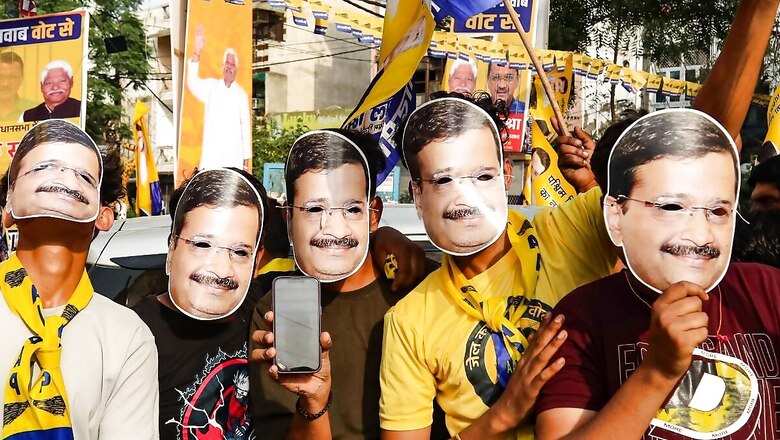
views
The Supreme Court on Friday granted interim bail to Delhi Chief Minister Arvind Kejriwal, who was in judicial custody in the Delhi liquor policy case, till June 1, bringing much-needed relief for Aam Aadmi Party (AAP) workers and supporters in the midst of a charged Lok Sabha election battle. Kejriwal was arrested by the Enforcement Directorate on March 21 and has been in custody since then.
The bench noted that the case was registered in August 2022 and the chief minister was arrested only in March 2024 — after nearly one-and-a-half years. “August 2022, the ED registered the ECIR. He was arrested in March 2024. For one and a half years he was there. Arrest could have been even afterwards or before. Then, 21 days here or there should not make any difference,” the court noted.
Amid opposition that the agency had evidence against Kejriwal and election campaigning must not be a criterion for considering grant of interim bail, the court had observed that it was dealing with the case of an elected chief minister and not a habitual offender, and the general elections take place only once in five years.
During the hearing on May 7, the bench orally suggested that if indeed interim release was directed, Kejriwal would not be allowed to perform official duties, as that would have a cascading effect.
As Kejriwal and the AAP heave a momentary sigh of relief, News18 takes a look at the various kinds of bail provisions and what distinguishes them.
First, what is bail?
In legalese, bail refers to the legal mechanism that reconciles an accused’s right to freedom with the public interest of ensuring their appearance in court for trial. It primarily involves releasing an accused from custody on the condition that they will appear in court at a later stage. Criminal offences in India are categorised as bailable and non-bailable crimes.
What are the kinds of bail?
There are five kinds of bail provisions in India: Regular, Anticipatory, Interim, Default, and Medical.
Regular Bail: In case of regular bail, a court can order the release of a person suspected to have committed an offense, with the condition that they do not obstruct the course of justice. This may involve executing a bond with sureties. When a person is arrested for a bailable offence, they have the right to be released as per Section 436 of the Code of Criminal Procedure (CrPC). The maximum period of detention for an undertrial is also defined under which, if an accused — during the investigation — has been detained for a period equal to 50 per cent of the maximum imprisonment term for the offence, they shall be released upon executing a bond, with or without sureties. However, in vases of non-bailable offences, the granting is purely discretionary and can be availed only if a strong case is presented. Some grounds on which bail can be granted for non-bailable offences are if the accused is below or at 16 years of age; if the accused is a woman; or if the accused is ill.
Anticipatory Bail: If an individual anticipates being charged with a non-bailable offence, they can seek anticipatory bail under Section 438 of the Code of Criminal Procedure (CrPC). The application for such a bail should be filed in the High Court or Sessions Court having jurisdiction over the alleged crime. Anticipatory bail is sought before arrest and, if granted, it means the police can no longer arrest the individual.
There are certain conditions that must be met for the grant of anticipatory bail. These are:
a) Reasonable Apprehension: This means there should be justified fear that the accused may be arrested in connection with the case for which anticipatory bail is being sought.
b) Bailable offence
c) Pre-Arrest Application: The application for anticipatory bail must be submitted before the arrest takes place.
d) Not a habitual offender
e) No departure from country without court nod
Interim Bail: Seen as temporary relief, interim bail is granted during the pendency of an application for anticipatory or regular bail. It is conditional and can be extended based on the circumstances. If the interim bail expires and the accused fails to meet the requirements for its continuation or pay the necessary amount, their right to freedom is revoked, and they may be taken into custody once again. Interim bail is essentially a stop-gap arrangement until a final decision is made on the bail application.
Default Bail: According to Section 167 of the Code of Criminal Procedure (CrPC), when a person is arrested and the investigation cannot be completed within 24 hours, they must be presented before a Magistrate. The Magistrate can then authorise their detention for a maximum period of 15 days, even extending it if need be. However, Section 167(2) of the CrPC specifies that in cases involving offenses punishable by death, life imprisonment, or imprisonment of at least 10 years, the detention period cannot exceed 90 days. For other offences, the limit is 60 days. If the police or investigating agency fails to file a chargesheet or complaint within the specified period, the accused is entitled to default bail.
Medical Bail: This is granted solely on medical grounds in cases where a person’s health requires immediate medical attention or specialised treatment.
What kind of bail did Kejriwal get?
The Delhi chief minister has been granted interim bail till June 1. The Aam Aadmi Party leader can campaign in the ongoing Lok Sabha elections, but will have to surrender on June 2 — two days before the results. He can also not take charge of the chief minister’s office.
Stay informed with live updates on the latest Supreme Court order regarding the grant of Interim Bail To Delhi Chief Minister Arvind Kejriwal in the money laundering case.















Comments
0 comment